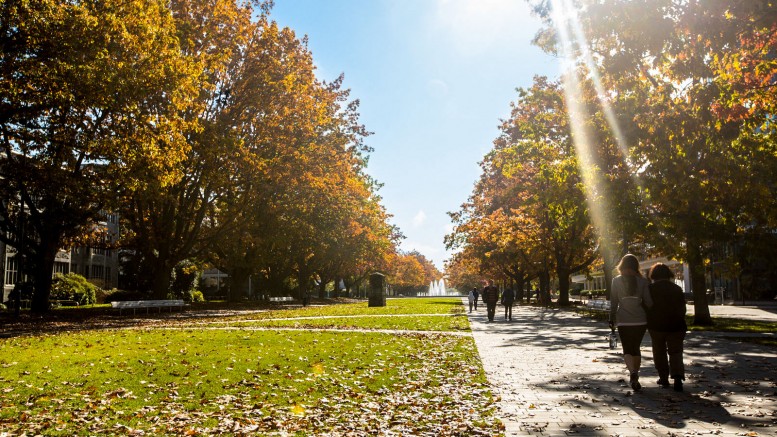VANCOUVER – All eyes are on the University of British Columbia (UBC) after a CBC investigation revealed problems in the way the university’s administration handled multiple allegations of sexual misconduct against former PhD student Dmitry Mordvinov.
In the wake of the CBC’s reporting on the issue, which was featured in the fifth estate documentary “School of Secrets,” UBC’s interim president Martha Piper issued an apology to the women allegedly assaulted by Mordvinov, a 28-year-old former history student.
Piper noted that she appreciates “the light the women have shone on this issue,” pledging that UBC “will begin a discussion with our students, faculty, and staff on a separate sexual assault policy.”
Despite Piper’s statement, Glynnis Kirchmeier – one of the women who made a report to UBC regarding Mordvinov’s inappropriate behaviour toward her – announced in a press conference in November that she would be filing a complaint with the BC Human Rights Tribunal. The complaint will be made against the university over its handling of the reported incident.
According to Kirchmeier, she brought concerns about Mordvinov to the history department in January 2014 for behaviours she had witnessed as far back as 2011.
However, Mordvinov wasn’t expelled until November 2015.
“UBC has a legal duty to provide a harassment-free environment. The Supreme Court of Canada has stated that there’s a legal duty to warn potential victims, and UBC has a legal duty to report their knowledge to the police,” said Kirchmeier at the press conference.
“In my well-documented experience of 22 months of speaking to 10 employees from four offices within the university, UBC administrators utterly ignored these ethical and legal duties.”
According to the CBC, at least two allegations surfaced in 2014 against Mordvinov. Moreover, the CBC reported that at least six women made complaints about Mordvinov beginning as early as the spring of 2013.
Although Piper remained adamant in the last meeting of the UBC senate that sexual assault will not be tolerated on campus, a statement issued by UBC spokesperson Susan Danard also noted “we can do better and we will do better.”
“While the university had to wait until it had the necessary facts to take action, I acknowledge that the process took too long,” Piper said in a statement on the university’s website, which was then circulated in an email to the entire UBC community the night that the CBC documentary was set to air.
Despite these statements, Kimberley Beck, legal counsel at the office of the university counsel, said that she believes the university’s current process for victims of assault is effective.
“I think the people who go through our process are generally satisfied with the care and attention […] that the committee gives to them,” Beck said regarding the non-academic misconduct committee that deals with reports of sexual assault when they’ve been made internally.
The process uses a structure of investigation in which both victim and perpetrator are asked questions by the committee.
“In cases of sexual assault […] if they wish not to be seen by the alleged perpetrator, we can put up screens, we can make other arrangements. We can do it by video conferencing,” Beck said.
The committee is made up of a group of selected students. According to Ashley Bentley, manager of the student union’s Sexual Assault Support Centre (SASC), many victims of sexual assault may not wish to report in this way because it involves disclosure to a group of students.
Bentley also noted that the lack of a single policy specifically dealing with sexual assault can be problematic. Currently, the university relies on what is known as “Policy 3,” which relates to harassment and discrimination, to deal with sexual assault allegations.
According to a board document, the office received 273 files and only six were referred for formal investigation under Policy 3 over the last 18 months.
In addition, certain victims have said they felt silenced by the university.
“I have been asked to share the experience of one current student not in the faculty of arts. She told me that she reported an abusive colleague to the equity office a year and a half ago, and they gave her a […] ‘gag-order’ – her words,” said Kirchmeier.
As a result of the slow process to expel Mordvinov, UBC will have to face the consequences of Kirchmeier’s complaint to the BC Human Rights Tribunal.
“Now the lights are turned on and the university is going to be tried in the court of public opinion. Then it is going to answer to the BC Human Rights Tribunal and I suspect it will be tried in civil court as well. UBC did this to itself,” Kirchmeier said.
When asked where Beck felt that the process of reporting and handling a sexual assault was weak, she spoke mainly of getting information to students about the options they have available to them after an assault.
“I think a place we could do better is getting information out to our community – particularly our students – about what’s out there for them, about the places they can go,” Beck said.
“What we want to do is make sure that we are communicating clearly to our students what their resources are.”
Some have been calling for a policy review following the complaints against Mordvinov.
When asked whether UBC’s process for handling sexual assault will change in the future after these concerns about UBC’s reporting process, Chad Hyson, associate director of student conduct and safety, said “we’re constantly taking in the feedback that we’ve received regarding our processes as any organization does.”
“We learn every time we have a hearing,” said Hyson.
According to a recent UBC statement, the university has since appointed Paula Butler, labour and employment lawyer with Butler Workplace Solutions, to conduct an independent review. The review will focus on UBC’s “response to concerns of sexual harassment and sexual assault raised by some UBC students about a fellow student, which became the subject of media coverage.”
Bulter’s report will be released next month, with a summary of the report made available to the UBC community.
With files from Helen Zhou, Joshua Azizi, Sophie Sutcliffe, Danni Shanel and Sruthi Tadepalli.
– National University Wire



